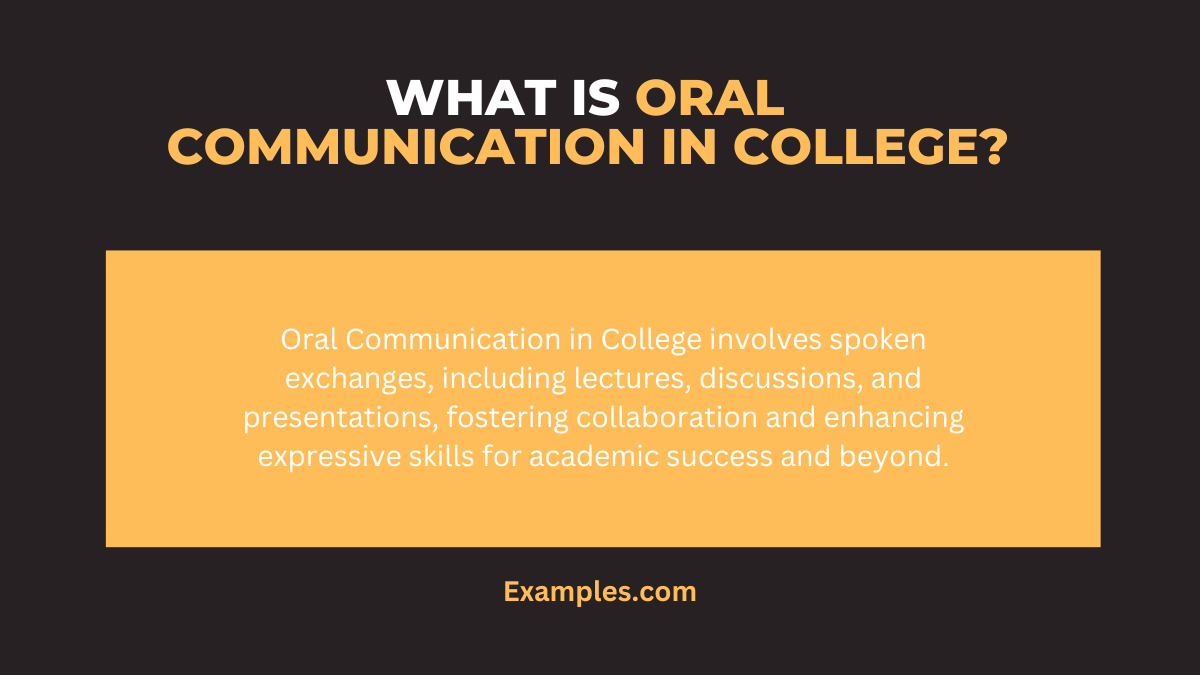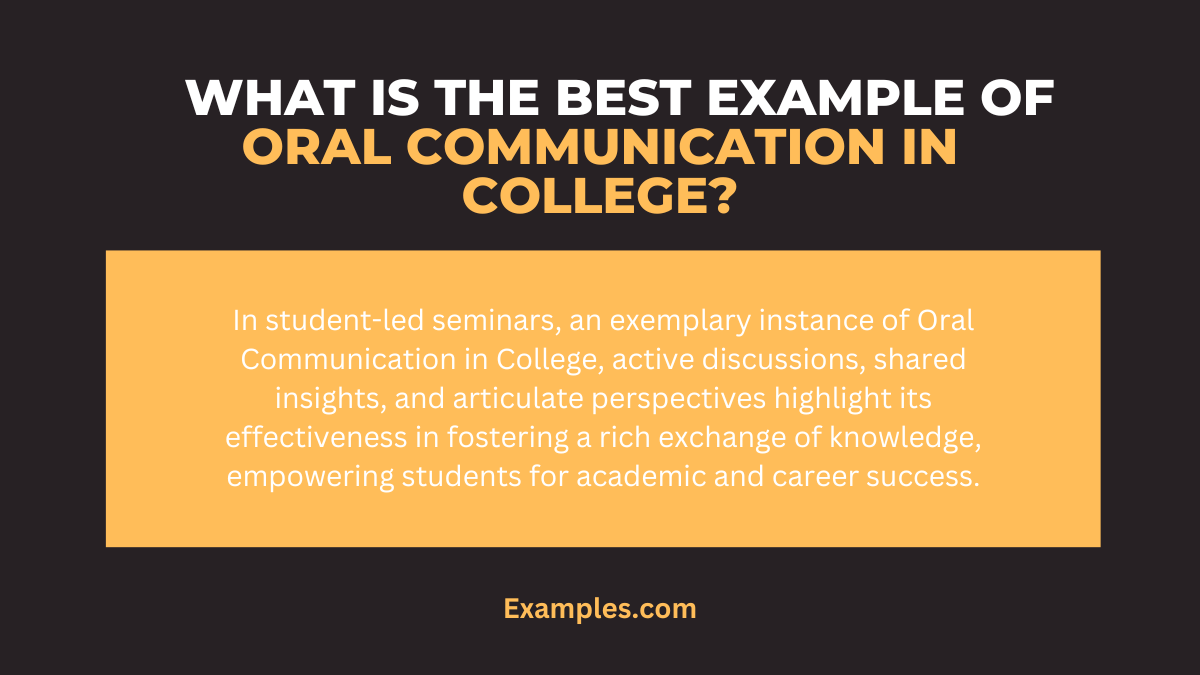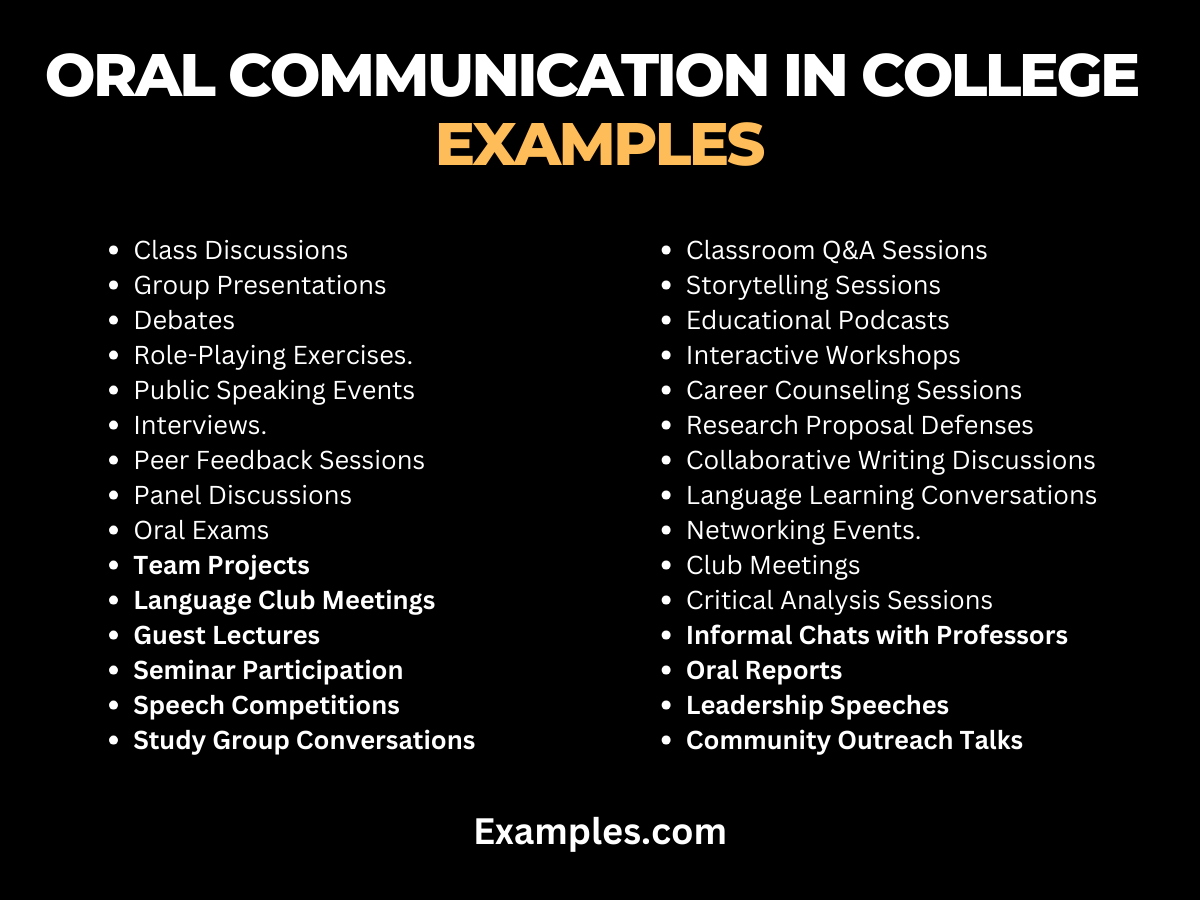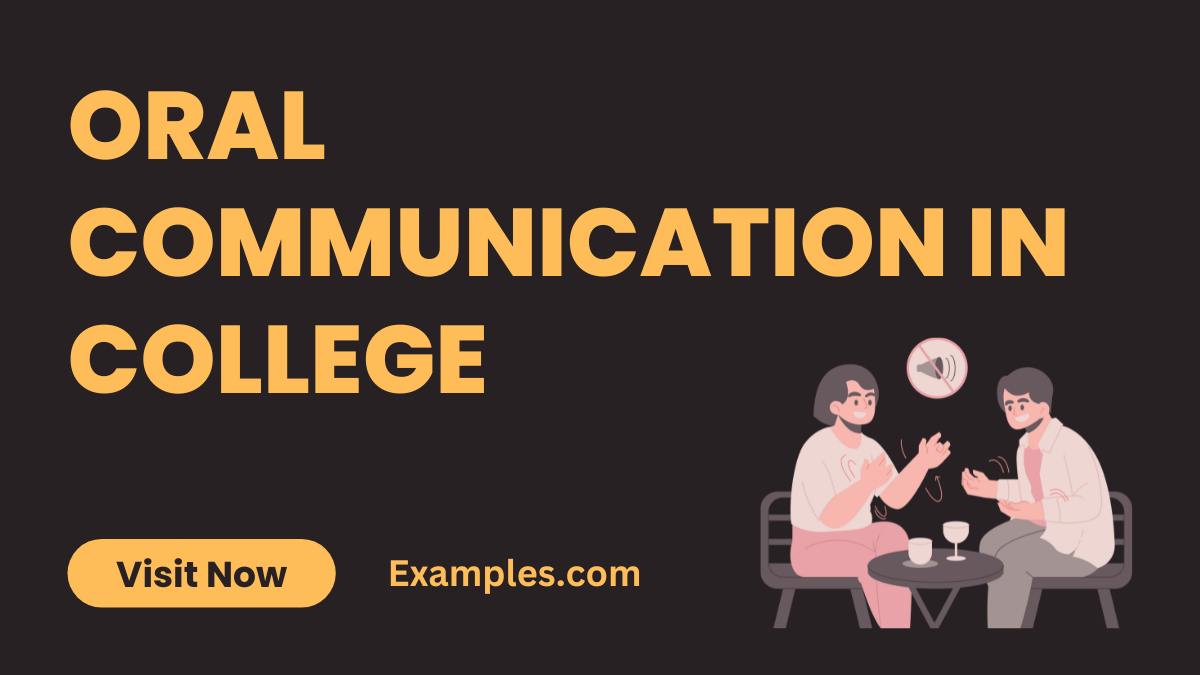Oral Communication in College
Embark on a comprehensive journey into Oral Communication in College, a pivotal skill for academic success. This complete guide delves into the nuances of effective communication, offering practical tips, expert insights, and illuminating Communication Examples. Elevate your college experience by mastering the art of verbal expression, essential for interviews, student interactions, and professional growth. Enhance your skills, connect meaningfully, and thrive in the dynamic world of collegiate communication. Explore the power of spoken words and boost your communication prowess today.
What is Oral Communication in College?

Oral Communication in College refers to the exchange of information, ideas, and thoughts through spoken words within the academic setting. It encompasses lectures, discussions, presentations, and interpersonal dialogues. This dynamic form of communication plays a pivotal role in fostering collaboration, understanding, and effective learning. Students engage in verbal interactions, honing their expressive skills crucial for academic success and beyond.
What is the Best Example of Oral Communication in College?

An exemplary instance of Oral Communication in College is the student-led seminar. In this scenario, students actively discuss course topics, share insights, and articulate their perspectives. The free-flowing dialogue, questions, and responses showcase the effectiveness of oral communication in facilitating a rich exchange of knowledge. Such interactive sessions empower students to express ideas, enhance critical thinking, and cultivate essential communication skills vital for their academic journey and future careers.
30 Oral Communication in College Examples

Oral Communication in College encompasses diverse instances where students express ideas verbally. Effective communication skills are essential for academic success and beyond. Here are 30 examples:
- Class Discussions: Engage in open conversations during class to share perspectives.
- Group Presentations: Collaborate with peers to deliver informative presentations.
- Debates: Participate in structured debates to develop argumentative skills.
- Role-Playing Exercises: Simulate real-world scenarios for practical communication.
- Public Speaking Events: Showcase your speaking prowess in college events.
- Interviews: Hone interview skills through mock sessions and actual interviews.
- Peer Feedback Sessions: Provide constructive feedback to classmates.
- Panel Discussions: Contribute to panel discussions on relevant topics.
- Oral Exams: Demonstrate knowledge through verbal assessments.
- Team Projects: Collaborate orally for effective project execution.
- Language Club Meetings: Join language clubs for linguistic expression.
- Guest Lectures: Attend and engage in lectures by guest speakers.
- Seminar Participation: Actively contribute to academic seminars.
- Speech Competitions: Compete or participate in public speaking competitions.
- Study Group Conversations: Exchange ideas within study groups for enhanced understanding.
- Classroom Q&A Sessions: Pose questions and respond to inquiries.
- Storytelling Sessions: Share personal or academic stories for connection.
- Educational Podcasts: Create podcasts discussing educational topics.
- Interactive Workshops: Attend workshops that emphasize verbal interaction.
- Career Counseling Sessions: Discuss future plans with career counselors.
- Research Proposal Defenses: Defend research proposals orally in academic settings.
- Collaborative Writing Discussions: Discuss collaborative writing projects verbally.
- Language Learning Conversations: Practice language skills through verbal communication.
- Networking Events: Engage in networking to build professional connections.
- Club Meetings: Participate in various college clubs and express ideas.
- Critical Analysis Sessions: Analyze literature or academic texts through discussion.
- Informal Chats with Professors: Seek guidance through casual conversations.
- Oral Reports: Present findings or research outcomes verbally.
- Leadership Speeches: Deliver speeches in leadership or student government roles.
- Community Outreach Talks: Engage in verbal communication during community outreach activities.
These examples showcase the diversity of oral communication skills developed in a college setting, preparing students for future endeavors.
Oral Communication in College for Interview
Enhancing oral communication skills in a college setting is crucial for successful interviews. Students can refine their abilities through various experiences, such as:
- Mock Interviews: Simulate real interview scenarios to practice responses.
- Career Fair Interactions: Engage with recruiters to articulate career goals.
- Elevator Pitch Practice: Perfect a concise introduction for networking events.
- Behavioral Question Workshops: Address common interview questions effectively.
- Panel Interview Simulations: Experience and navigate group interviews confidently.
- Industry Networking Events: Communicate with professionals in relevant fields.
- Resume Walkthroughs: Discuss your qualifications and experiences articulately.
- Company Information Sessions: Ask insightful questions during employer presentations.
- LinkedIn Profile Reviews: Communicate your professional brand effectively online.
- Thank You Note Crafting: Express gratitude professionally after an interview.
Oral Communication in College for Students
Effective oral communication is vital for academic success and personal development. College students can actively participate in a variety of communication scenarios:
- Classroom Discussions: Share insights and engage with peers and professors.
- Group Project Coordination: Communicate roles and ideas within a team.
- Faculty Office Hours: Seek clarification and express academic concerns.
- Club Leadership Meetings: Lead and contribute verbally in extracurricular activities.
- Presenting Research Findings: Clearly convey research outcomes to an audience.
- Participating in Seminars: Contribute meaningfully to academic discussions.
- Attending Academic Conferences: Engage in discussions with scholars.
- Collaborative Study Groups: Verbally discuss and deepen understanding.
- Peer Tutoring Sessions: Effectively communicate concepts to fellow students.
- Student Government Meetings: Voice concerns and ideas in governance discussions.
Oral Communication in College for Business
Enhancing oral communication skills in a business context is crucial for students. This domain emphasizes effective interaction, negotiation, and presentation. Engage in:
- Business Presentations: Master the art of delivering compelling presentations on business topics.
- Negotiation Simulations: Simulate negotiations to develop effective communication strategies.
- Mock Job Interviews: Prepare for the corporate world with simulated job interviews.
- Business Pitch Competitions: Participate in competitions to refine pitching skills.
- Team Building Exercises: Develop teamwork and communication in business-oriented scenarios.
- Client Interaction Workshops: Learn to communicate professionally with potential clients.
- Case Study Analyses: Present insights on business cases through articulate communication.
- Industry Guest Lectures: Attend lectures by professionals to understand real-world communication challenges.
- Business Report Discussions: Effectively discuss and interpret complex business reports.
- Professional Networking Events: Practice networking to build business connections.
Each example prepares students for effective oral communication in the dynamic realm of business.
Oral Communication in College for Teachers
Oral communication is a foundational skill for educators. Teachers engage in various communication scenarios vital for effective instruction and classroom management. Explore:
- Parent-Teacher Conferences: Navigate conversations with parents to discuss students’ progress.
- Classroom Discussions: Foster a communicative classroom environment for student engagement.
- Instructional Presentations: Deliver clear and engaging instructions to facilitate learning.
- Faculty Meetings: Contribute to discussions and communicate ideas in academic meetings.
- Student Counseling Sessions: Communicate effectively while guiding students through academic challenges.
- Parent Workshops: Conduct workshops for parents to enhance their involvement in education.
- Peer Collaboration Discussions: Engage in discussions with fellow educators for professional development.
- Feedback Sessions: Provide constructive feedback to students for academic improvement.
- Professional Development Seminars: Attend and actively participate in seminars to enhance teaching skills.
- Public Speaking in Education Conferences: Share educational insights in conferences for broader impact.
These examples demonstrate the diverse oral communication skills essential for educators in a college setting.
What is Oral Communication Class in College?
Oral communication classes in college are designed to equip students with essential skills to express ideas effectively through spoken words. These classes focus on honing various aspects of verbal communication, such as public speaking, interpersonal communication, and presentation skills. Students engage in activities like group discussions, debates, presentations, and role plays to enhance their ability to articulate thoughts clearly. Emphasis is placed on nonverbal cues, voice modulation, and persuasive communication techniques. The goal is to prepare students for real-world scenarios where effective oral communication is paramount.
Why is Oral Communication Important in College?
Oral communication holds immense significance in the college environment for several reasons:
- Academic Success: Effective communication is vital for understanding lectures, participating in class discussions, and clarifying doubts with professors.
- Collaborative Learning: Many college assignments and projects involve group work, requiring students to communicate ideas, delegate tasks, and work cohesively.
- Presentation Skills: Colleges often require students to present research findings, projects, or participate in seminars, necessitating strong presentation and public speaking skills.
- Career Readiness: Beyond academics, oral communication is a key employability skill. Job interviews, networking events, and workplace interactions demand effective verbal expression.
- Leadership Development: Students involved in leadership roles or extracurricular activities benefit from strong oral communication skills to influence and lead others.
- Critical Thinking: Expressing thoughts verbally encourages critical thinking, helping students articulate and defend their viewpoints.
- Interpersonal Relationships: Effective communication fosters positive relationships among peers, faculty, and within the college community.
- Cultural Competence: Colleges often have diverse student bodies, and effective oral communication promotes understanding and collaboration among students from various backgrounds.
In essence, mastering oral communication in college not only contributes to academic success but also prepares students for the multifaceted challenges of the professional world.
What are the Types of Oral Communication in College?
Oral communication in college encompasses various forms that are crucial for academic and personal development. The four main types are:
- Formal Presentations: In academic settings, students often engage in formal presentations, delivering information on research, projects, or assigned topics. This type emphasizes structured communication and public speaking skills.
- Classroom Discussions: Interactive discussions within classrooms promote the exchange of ideas and opinions. Students actively participate, share perspectives, and learn from one another, fostering a dynamic communicative environment.
- Group Projects and Collaborations: Collaborative work is a common aspect of college life. Effective communication within groups ensures successful completion of projects, presentations, and assignments, requiring coordination and cooperation.
- Oral Examinations: Some courses may include oral exams where students verbally demonstrate their understanding of the subject matter. This form assesses both knowledge and the ability to articulate concepts.
Understanding these types equips college students with versatile oral communication skills vital for academic success.
How to Create an Oral Communication in College?
Crafting effective oral communication in college involves a systematic approach to convey information clearly. Follow these steps to create impactful oral communication:
- Define Your Purpose: Clarify the objective of your communication. Whether it’s a presentation, discussion, or project, a clear purpose guides the content and tone.
- Organize Your Content: Structure your communication logically. Create an outline or script to ensure a coherent flow, making it easier for your audience to follow.
- Adapt to Your Audience: Consider your audience’s background, knowledge, and interests. Tailor your communication to resonate with them, ensuring engagement and understanding.
- Practice and Rehearse: Practice is key to effective communication. Rehearse your presentation or discussion to build confidence, refine your delivery, and identify potential improvements.
- Utilize Visual Aids: Enhance your communication with visuals like slides, charts, or graphs. Visual aids reinforce key points and make complex information more accessible.
- Encourage Interaction: Foster audience engagement by incorporating opportunities for questions, discussions, or group activities. Interaction enhances understanding and retention.
- Consider Nonverbal Elements: Pay attention to body language, tone, and gestures. Nonverbal cues complement your words and convey additional meaning to your audience.
- Seek Feedback: After your communication, seek feedback from peers or instructors. Constructive feedback helps refine your skills for future interactions.
By following these steps, you can create oral communications in college that are engaging, informative, and impactful.
Tips for Effective Oral Communication in Colleges?
Mastering effective oral communication is essential for success in college. Implement these tips to enhance your skills:
- Active Listening: Cultivate active listening skills to understand and respond appropriately during discussions or presentations.
- Confidence Building: Work on building confidence in your ability to communicate. Practice regularly to overcome nervousness and speak with assurance.
- Clarity and Conciseness: Strive for clear and concise communication. Express ideas succinctly, avoiding unnecessary details that may confuse your audience.
- Nonverbal Communication: Be mindful of nonverbal cues such as eye contact, posture, and gestures. These elements contribute to effective communication.
- Adaptability: Be adaptable in your communication style based on the context and audience. Flexibility enhances your ability to connect with diverse groups.
- Use of Technology: Familiarize yourself with relevant communication technologies. Utilize tools like presentation software and virtual platforms for effective communication.
- Preparation: Thoroughly prepare for any oral communication opportunity. Knowing your material boosts confidence and minimizes nervousness.
- Feedback Incorporation: Act on constructive feedback received from peers or instructors. Continuous improvement is a key aspect of effective communication.
By incorporating these tips into your approach, you can navigate oral communication in college with confidence and competence.
Mastering oral communication in college is crucial for academic and personal growth. This comprehensive guide covered types, creation, and tips, providing a foundation for effective and impactful communication in educational settings.
In conclusion, oral communication in college is an indispensable skill that significantly influences academic success, personal development, and future career prospects. As this guide has detailed, mastering the art of verbal expression in various academic scenarios – from classroom discussions to formal presentations – is essential for effective learning and collaboration. The ability to articulate ideas clearly and confidently enhances students’ participation in academic dialogues, contributing to a richer educational experience.
For additional resources and support in developing oral communication skills, students can refer to Harvard University’s resources on public speaking and communication. Their extensive materials provide valuable insights into effective communication techniques, particularly useful for those looking to refine their public speaking abilities. Visit Harvard’s Public Speaking Resources for more information.
Furthermore, the Toastmasters International website offers a wealth of information on improving communication skills, with a focus on public speaking. This platform is ideal for students and professionals alike who are seeking to enhance their oral communication abilities in various contexts. Explore Toastmasters International to discover tools and tips for effective verbal communication.
By utilizing these resources and implementing the strategies discussed in this guide, students can significantly improve their oral communication skills, paving the way for academic achievement and professional excellence in their future endeavors.



